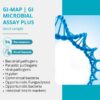- Your cart is empty
- Continue Shopping
‘All tests we do at FMD are aimed at finding the root cause of your health problem. These are not the usual diagnostic tests that you do, but much, much more.’
‘All tests we do at FMD are aimed at finding the root cause of your health problem. These are not the usual diagnostic tests that you do, but much, much more.’

₹37,999.00 ₹34,999.00
₹37,999.00 ₹34,999.00
Test Parameters:
The gut microbiome plays a critical role in mediating the effects of diet and other factors on health, including digestive, immune, metabolic and neuroendocrine functions. Assessing GI health with the proper tools can help practitioners get to the root cause of chronic illness.
 Reporting Time: 2-4 weeks
Reporting Time: 2-4 weeks Stool Test
Stool Test  Best and Honest Price
Best and Honest PriceSome conditions that that definitely benefit from GI Map testing are:
What is Reported on GI-MAP Test Results?
The GI-MAP is designed to detect microbes that may be disturbing normal microbial balance or contributing to illness as well as indicators of digestion, absorption, inflammation, and immune function.
The following is a listing of the microorganisms found on the GI-MAP:
Recent studies have shown that nearly 50% of the world’s population may harbor H. pylori. And, although many carriers are asymptomatic, H. pylori is known to have a causative role in ulcers, chronic gastritis, and stomach cancer.
Additionally, in early phases of colonization, patients may experience hypochlorhydria followed by a change to hyper aciduria. Over time, additional H. pylori strains may colonize, including those with Virulence Factors and increased disease potential.
Trillions of microorganisms inhabit the human intestine to make up a complex ecosystem that plays an important role in human health. Commensal bacteria extract nutrients and energy from our diets, maintain gut barrier function, produce vitamins (biotin and vitamin K), and protect against colonization by potential pathogens.
Commensal Bacteria
Bacteria Phyla
Many bacteria measured on the GI-MAP are considered opportunistic pathogens, as they only cause disease and illness in some individuals, particularly the immune-compromised. Many individuals come into contact with opportunistic bacteria and experience no symptoms. Most sources consider these microbes to be normal in the stool. However, they can cause gastroenteritis and inflammation at high levels in vulnerable patients. Symptoms may include diarrhea, loose stools, abdominal pain, or even constipation.
Overgrowth and excessive colonization by opportunistic bacteria may occur when the commensal bacteria are impaired by poor diet, antibiotic use, parasitic infection, or a weakened immune system. When intestinal permeability is present (see zonulin), these microbes could escape the lumen of the gut and infect extraintestinal sites.
ADDITIONAL DYSBIOTIC/OVERGROWTH BACTERIA
POTENTIAL AUTOIMMUNE TRIGGERS
Fungal organisms are commonly found in the human digestive tract, but fungal overgrowth can cause illness in susceptible individuals. Fungal growth may be localized in the body. For instance, Candida spp. may be high in the large intestine but normal in the small intestine, and vice versa. In a patient with suspected fungal overgrowth, additional tests may be necessary to understand the complete picture of fungal overgrowth. Urinary D-arabinitol or antibodies to Candida are sometimes used.
OPPORTUNISTIC VIRUSES
A parasite is an organism that lives and feeds on a host organism at the expense of the host. The GI-MAP tests for pathogenic parasites and protozoa (some of which are non-pathogenic) most commonly occurring in the GI tract. Sources of exposure should be identified and eliminated to prevent reinfection.
PROTOZOA
WORMS
DIGESTION
IMMUNE RESPONSE
INFLAMMATION
GI MARKERS
ADD-ON TESTS
Phenotypes | HELOBACTER
Order GI-MAP Test it is just a few simple step!
please enter the data where the GI-Map set should be send
Detailed instructions and a return envelope you will find in the GI-Map set
After 15-20 working days, you will receive detailed GI-Map analysis.
Our Working Process Healthcare model is shifting from Sickness care to Wellness.
Sample collection will be done from home

Sample is processed at Central Lab of our Trusted Partners.

Reports are accessible online.
Sample collection will be done from home

Sample is processed at Central Lab of our Trusted Partners.

Reports are accessible online.
Other Popular Test Packages Choose from our frequently booked test packages.